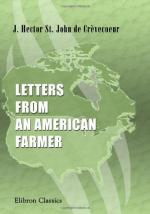purchase of the soil or not; whatever injustice might
have been committed in that respect, cannot be charged
to the account of those Friends who purchased from
others who no doubt founded their right on Indian
grants: and if their numbers are now so decreased,
it must not be attributed either to tyranny or violence,
but to some of those causes, which have uninterruptedly
produced the same effects from one end of the continent
to the other, wherever both nations have been mixed.
This insignificant spot, like the sea-shores of the
great peninsula, was filled with these people; the
great plenty of clams, oysters, and other fish, on
which they lived, and which they easily catched, had
prodigiously increased their numbers. History
does not inform us what particular nation the aborigines
of Nantucket were of; it is however very probable
that they anciently emigrated from the opposite coast,
perhaps from the Hyannees, which is but twenty-seven
miles distant. As they then spoke and still speak
the Nattick, it is reasonable to suppose that they
must have had some affinity with that nation; or else
that the Nattick, like the Huron, in the north-western
parts of this continent, must have been the most prevailing
one in this region. Mr. Elliot, an eminent New
England divine, and one of the first founders of that
great colony, translated the Bible into this language,
in the year 1666, which was printed soon after at
Cambridge, near Boston; he translated also the catechism,
and many other useful books, which are still very
common on this island, and are daily made use of by
those Indians who are taught to read. The young
Europeans learn it with the same facility as their
own tongues; and ever after speak it both with ease
and fluency. Whether the present Indians are the
decendants of the ancient natives of the island, or
whether they are the remains of the many different
nations which once inhabited the regions of Mashpe
and Nobscusset, in the peninsula now known by the
name of Cape Cod, no one can positively tell, not even
themselves. The last opinion seems to be that
of the most sensible people of the island. So
prevailing is the disposition of man to quarrel, and
shed blood; so prone is he to divisions and parties;
that even the ancient natives of this little spot
were separated into two communities, inveterately
waging war against each other, like the more powerful
tribes of the continent. What do you imagine was
the cause of this national quarrel? All the coast
of their island equally abounded with the same quantity
of fish and clams; in that instance there could be
no jealousy, no motives to anger; the country afforded
them no game; one would think this ought to have been
the country of harmony and peace. But behold the
singular destiny of the human kind, ever inferior,
in many instances, to the more certain instinct of
animals; among which the individuals of the same species
are always friends, though reared in different climates:
they understand the same language, they shed not each




